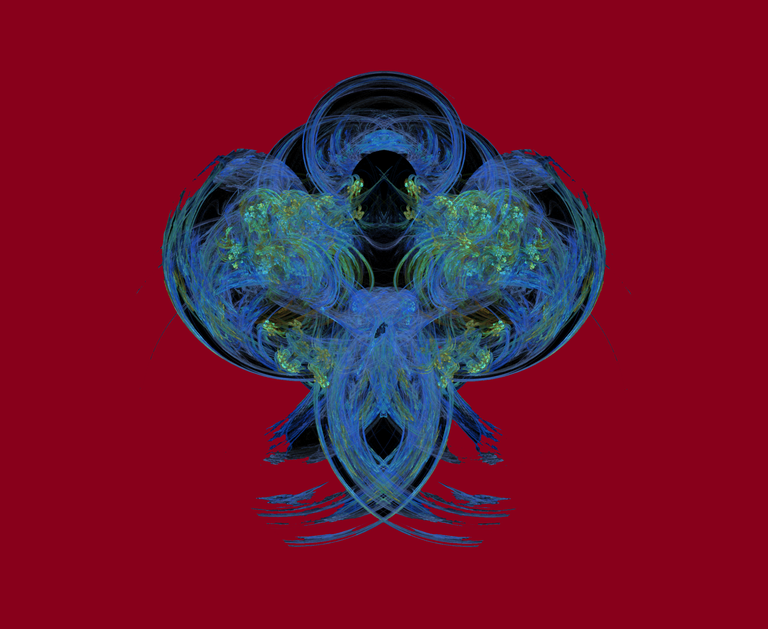This is the same pure fractal made in Apophysis 2.09 as last week, overlaid and colorized to give it a disguise!

“So, does the medical evacuation over there mean we are in trouble over here, too?”
“Well, this is good – you're asking the right questions,” said Admiral Joshua Feldstein, full admiral adjutant to full fleet admiral Elian Bodega, and in command while Admiral Bodega was on Earth speaking with the high command.
Meanwhile, my chief engineer was stressing ...
“Captain, no, I cannot give you another hour at Warp 9.8 – Warp 9.775 is the best we can do!”
“I'll take it, Lieutenant Commander Doohan.”
To understand why Adm. Feldstein was staying so calm while the Amanirenas and 20 other ships were running the risk of blowing our starships apart while he was on one of them, one first has to understand that “nearby” star systems are actually light-years apart, so even if they are in the same region, even at the speed of light, it will take years to get from one star system to another. Generally, a parsec, or 50 light-years, is the rough size of a stellar region … so if there is a star system in the middle making trouble on both ends, and you are on one end when you figure out there is trouble on the other, even at well over 900 times the speed of light, you've got some traveling to do.
This had all started 20 years before I was born – a particular stellar region had two star systems the consortium whose fleet I served had decided to settle, but in the middle was a civilization who felt that humanity's dark side reputation had preceded it, and did not want us in the region. They were space-faring also, but had nothing like the ability to stop the consortium from doing what it wanted to do. They registered a protest, and were told to mind their business in their star system and be thankful we had come through instead of the type of galactic empire who would take the whole region and kill them for speaking up.
“Yes, that is essentially what they were told, Captain Biles-Dixon,” Lt. Almuz my chief communications officer told me. “It was a bit more diplomatic, but not much.”
“What in the world is going on in our embassy department?” I said, but shook my head as no one answered me, because we already knew what the problem was: exploration and settlement were outstripping good diplomacy's ability to keep up, so new civilizations often were addressed essentially as some captain of a startship felt like addressing them, and there were a few captains who thought they were Christopher Columbus.
The problem in the 23rd century was that humanity's reputation preceded it by light-years, and forewarned is forearmed. So, the civilization so addressed, not having the brute force necessary, used its knowledge of the region and commerce skills to deal with what they knew about humanity – we love shiny things, especially gold-colored, and we think they are lucky. The civilization so addressed had access to the star systems the consortium wanted to settle, and a high, high tolerance for radioactivity … so they went and harvested the cesium-based creatures from one of the planets and sold them in one star system for living outdoor lanterns and in the other, suitably disguised, as indoor psychedelic lamps.
The human settlement that had the creatures used as indoor psychedelic lamps had heard about how Admiral Bodega had needed to send a flotilla to evacuate and decontaminate their fellow human settlement across the parsec, and suddenly realized: “So, does the medical evacuation over there mean we are in trouble over here, too?”
Yes. Yes, it did.
But Joshua Feldstein, in addition of being a fine fleet commander, was an excellent diplomat. He knew that if that settlement panicked and started trying to take its protection from the creatures into their own hands, the amount of radioactive cesium in said creatures would likely lead to fiery destruction of the settlement and fatal radiation poisoning for the survivors before we could get from one side of the parsec to another. So, he stayed calm, and stayed available, and kept the panic from breaking out, even while his own ship was in danger of flying apart because Warp 9.775 is not what you want your starship to be doing for any extended period of time.
“How Adm. Feldstein is keeping his teeth from chattering with that much vibration, I will never know,” Ensign Pushkin said to Lieutenant Morimoto as the Amanirenas quivered under our feet.
“That's what makes for an admiral,” the lieutenant said to the ensign. “First, survive about thirty years of this stuff, and be able to look good while you do it.”
“Captain Biles-Dixon is going to make a heck of an admiral, then, like her uncle,” the ensign said.
“Right, if we survive,” the lieutenant said as the quivering notably increased.
Fun things you can do if you are on the science officer track as a captain: you can tell your admiral how to run at Warp 9.775 to a certain point, cut the engines and slingshot around a big star's gravity well, and coast the rest of the way to your destination still at high speed down to Warp 6 so you don't blow your whole flotilla up.
“I see you want to live to be a commodore, Captain,” Adm. Feldstein said with a smile. “Great idea. Let's see if we can do it in formation.”
We did, of course. Like my tactical officer said, surviving and making it look good is part of the job, and when your consortium is down close to a billion people in terms of having to reverse settlement decisions, every event of saving face counts.
Adm. Feldstein had decided on and Adm. Bodega had approved a simple course of action that relieved the settlement and brought the risk to the fleet where we could handle it: we just beamed all of the beautiful but deadly living lamps to our ship, cleaned them up, and took them home to their home planets, keeping them alive and thus safe for everyone along the way. The officer who had discovered these life forms 47 years earlier, Commodore Wilhelm Allemande, had accepted being re-commissioned for the purpose of helping us with these and heading off future challenges, and gave us good guidance that was successful.
Of course, Wilhelm Allemande being from the “hot” branch of his family, unlike my mild-mannered and immensely calm first officer Commander Helmut Allemande, had a comment, and he had not been back long enough to remember to be politically correct.
“So, Joshua, when are you sending your flotilla in there to hold the civilization responsible for poaching all those creatures accountable? They need to be taught a severe lesson for their 45 years of meddling!”
Adm. Feldstein outranked the commodore, but the commodore had been one of his teachers at the academy, and the commodore was 95 years old … so the admiral opted, as ever, for good diplomacy.
“The first thing I have to do is get these creatures home to their home world safely, and then I have to give my warp engines a rest, but I will forward your concerns to Adm. Bodega while he is meeting with the high command – and remember, Professor, I need you to practice. We're on a secure line, but you are a commissioned fleet officer again, and when the news comes looking for you to explain how all this was worked out, I need you to be diplomatic. I do not have to want to order you, because you taught me the duties of a fleet officer of high rank.”
“I never missed this part of the job, but, sir, yes, sir, Admiral, acknowledged, in my duty, and also in my heart, my student.”
Helmut Allemande's headache disappeared again after the press conference.
“Gott, Sie dank,” I heard him praying in gratitude, over and over again in his basso profondo voice, as his elder cousin was both brilliant and diplomatic at the press conference.
“Look, I'm just looking out for you younger people in the fleet, because if it was just me I would have cussed everybody over captain rank out last month and been done with this!” the commodore said later.
“But, Wilhelm, if you had done that, we wouldn't be able to work together now,” my uncle, Adm. Benjamin Banneker-Jackson said to him.
“You're a younger person by thirteen years, Ben,” the commodore said, his smile revealing the other side of his passionate nature. “You're mixed up now with me so I have to look out for your reputation too – I can't be embarrassing my student Joshua Feldstein, and I can't be embarrassing you, and my baby cousins Helmut and Konrad aren't even captains yet. So, yes, I'll hold it together another year or two, and then write my second memoir and tell the galaxy what I really think!”
“How do you know you won't be called out of retirement a third time?” my uncle kidded him.
“Oh, trust me, I am going to mess all that up, Ben – they didn't know after my first memoir that I am too hot to handle, but I'm going to take care of that!”
The commodore's baby cousin on the Amanirenas put his head in his hand, but was chuckling in his low voice.
“All's well that ends well,” I said. “Alles gut dass gut endet.”
He smiled.
“That's good, Captain – all good that good ends. The idiomatic way of saying it is, 'ende gut alles gut' – ends well, all well.”
